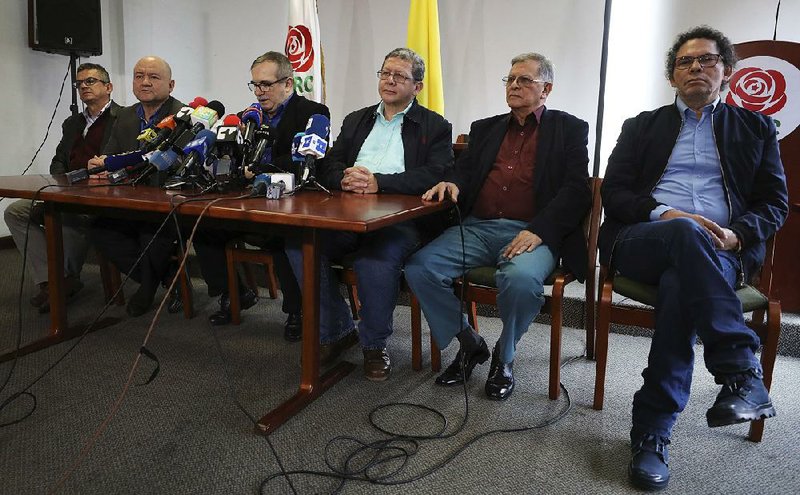BOGOTA, Colombia -- Colombian President Ivan Duque offered a nearly $1 million reward for the arrest of the top peace negotiator for the Revolutionary Armed Forces of Colombia on Thursday after the rebel and a small cadre of hard-liners vowed to resume their insurgency in a major reversal for the country's efforts to end decades of bloody fighting.
In a televised address, Duque also accused Venezuela's socialist leadership of providing safe haven to the rebels -- underscoring the risks to regional stability from the rebels' shock announcement that they would rearm.
In a video published after midnight Thursday, Luciano Marin appeared alongside some 20 heavily armed insurgents dressed in camouflage fatigues condemning the conservative Duque for standing by as hundreds of leftist activists and rebels have been killed since demobilizing as part of the peace deal.
"When we signed the accord in Havana we did so with the conviction that it was possible to change the life of the most humble and dispossessed," said Marin, better known by his alias Ivan Marquez, in the video. "But the state hasn't fulfilled its most important obligation, which is to guarantee the life of its citizens."
Marin read the lengthy remarks from what looked like an established guerrilla camp in what he said was Colombia's eastern jungles.
But Colombian authorities swiftly alleged the video was shot in neighboring Venezuela -- long a strategic rearguard for the rebels and whose socialist government President Donald Trump's administration and several conservative U.S. allies, especially Duque, have been seeking to remove.
"We're not witnessing the birth of a new guerrilla army, but rather the criminal threats of a band of narcoterrorists who have the protection and support of Nicolas Maduro's dictatorship," Duque said. "We won't fall into the trap of those pretending to shield themselves behind false ideological clothing to sustain their criminal structure."
The decision to return to arms was overwhelmingly rejected by Colombians, many of whom believe the rebels benefited from a sweetheart pact of impunity. It comes as the peace process is at risk of unraveling because of what critics see as its slow implementation and a surge in killings of social leaders in far-flung rural areas where the rebels had long been dominant.
With two pistols strapped to his belt, Marin pledged a "new phase" in Colombia's armed conflict and vowed to seek alliances with another rebel group, the National Liberation Army. Standing alongside him were several former leaders of the Revolutionary Armed Forces of Columbia including ideologue Seuxis Hernandez, alias Jesus Santrich, who abandoned the peace process after prosecutors in New York ordered his arrest on drug charges.
Maduro last month said the fugitive rebel leaders would be welcome in his nation and for months, Colombian military intelligence officials have alleged that Marin, Hernandez and several top National Liberation Army commanders were hiding out in the neighboring country.
By nightfall, a special peace tribunal investigating the rebels' war crimes ordered the arrest of Marin, Hernandez and two other prominent rebels appearing alongside them in the call to arms.
The court, which has drawn criticism from Duque for being too lenient, said the deserting rebels had lost all benefits under the peace deal. Under the accord, rebels who confess their involvement in war crimes like the kidnappings of civilians and recruitment of child soldiers will be spared jail time and protected from extradition to the U.S., which has charged the group's top leadership with cocaine trafficking.
It's unclear how the decision by Marin to rearm will affect Colombia's delicate security balance. More than 90% of the 13,060 ex-combatants and civilian supporters who handed over weapons to United Nations observers in 2016 continue to live up to their commitments under the peace deal.
But a group of dissident rebel commanders never demobilized and have seen their ranks swell to about 2,500 fighters through recruitment. They continue to terrorize isolated rural communities, especially along Colombia's borders with Venezuela and Ecuador, profiting from a booming cocaine trade in those areas.
In addition, the more radical National Liberation Army has filled the void left by withdrawing rebels and stepped up attacks in cities, including the car bombing of a police academy in Bogota that killed 22 people.
Rodrigo Londono, who had been the rebel group's top military commander and now heads its legal political party, immediately distanced himself from his former comrades, with whom relations have been strained in the past year. In an interview with Blu Radio he apologized to his fellow Colombians and the international community, saying that the vast majority of rebels remain committed to the peace process despite rising security risks.
"I have mixed feelings," said Londono, "It's an unfortunate development, but at the same time it leaves things clearer and ends the ambiguity because we had been facing a complex situation for some time."
A Section on 08/30/2019
